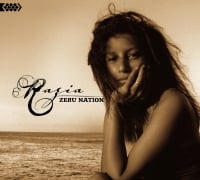Zebu Nation
$13.00
Singer and songwriter Razia Said’s nomadic life has taken her across Africa to France, Italy, Ibiza, Bali and New York City, but despite these wanderings, her heart and soul remains inexorably tethered to Madagascar, the land of her birth. Her musical explorations have also been wide ranging, and over the years Razia has experimented with French chanson, rock, jazz and even smooth, Sade-style R&B. But it took reaching back to her cultural roots for Razia to uncover her true artistic calling and emerge as both a unique voice in the global music scene as well a passionate advocate for the environment.
Razia spent her childhood in the town of Antalaha in northeastern Madagascar. The source for the world’s most prized Bourbon vanilla, Antalaha is one of Madagascar’s wealthiest communities, although there remains a great gap between rich and poor. Razia was born on December 1, 1959 to a Malagasy/Comorian mother and a Malagasy/Indian father. Her mother was just a teenager when Razia was born and not yet ready for the role of parenting. To diffuse the scandal and to work, her mother was sent to the Comores Islands and Razia’s grandparents raised her as their own in a bustling household filled with relatives. Razia’s grandfather owned vanilla, coffee, and cloves plantations near the Masoala national park, which Razia loved to visit. As a young girl Razia was a real tomboy, you could always find her climbing in trees and exploring the exotic natural world around her. Razia first heard the infectious rhythms of local salegy music blasting out of the town’s ubiquitous radios. It was one of Razia’s uncles that first introduced her to French music as well as The Beatles, James Brown, Jimi Hendrix and other Western stars. Her younger uncle even invited her to sing the latest French pop songs on stage with his band when she was just ten years old.
Believing that her grandparents were her parents, Razia was in for a shock when she learned at age eleven that “Aunt Hassanatte” who regularly visited from the Comores was actually her mother. In fact, by that time Razia’s real mother had married a French architect and wanted Razia to join them in the West African country of Gabon. Suddenly, Razia was uprooted from the world she knew and traveled on an epic journey through Dar Es Salaam, across the Congo River to a new life and family. In Gabon, Razia discovered that the local church had a choir, but one had to be Catholic to join, and Razia was raised a Muslim. Music was far more important to her then the details of which God she prayed to, so she begged her mother to allow her to convert…which she did. Razia was also exposed to the funky grooves of Fela, the poetry of Pierre Akendengue, Papa Wemba and other African artists who were popular in Gabon at the time.
After three years in Gabon, Razia was sent to boarding school in southern France, where she flirted with the idea of playing the guitar but felt intimidated by the fact that she is left handed. Seeking economic stability, Razia received her doctorate in Pharmacology and moved to Paris. But her passion remained with the arts, and in Paris, Razia made a living through modeling, acting and occasional music gigs. In 1987, Razia moved to New York City with her boyfriend who will soon be the father of her daughter. Over the years, Razia lived in Bali, Ibiza and Milan, working as a stylist, an actor and in fashion, struggling all the while to find her own musical direction. Razia was eager to create and record her own songs; while she was expecting her daughter, she decided to enroll at the New School in New York to learn to play guitar. She then started writing original songs, including some in the Malagasy language.
A few years later Razia met and married Jamie Ambler, a musician, filmmaker and creative director in advertising. Together they started recording her first album. While Razia was happy to have gotten some of her songs recorded, the pop-oriented, English-language R&B and jazz direction left her unfulfilled; she wanted to get back to her roots. Razia eventually met at the Womex ( world music festival) the manager of the famous Malagasy band Njava based in Belgium. He suggested that Razia record with them, songs in the Malagasy language and inspired by the rhythms, melodies and instruments from her childhood.
Thus began the long and challenging process of recording of her album Zebu Nation. Work began in 2006 In Belgium, where Njava was based, but Razia felt that the only way to truly capture the sound she was looking for was to bring the producers to Madagascar to record with local musicians in the right setting. For six weeks, they traveled around the island, and discovered along the way the environmental damage taking place as the result of unfettered slash and burn agriculture and climate change. Razia’s longing to protect and preserve the environmental and cultural heritage of her homeland permeated the songs on the album, and gave Zebu Nation a powerful, real-world significance.
In order to finish Zebu Nation Razia and Jamie spent the next couple of years working with a range of producers and musicians, such as Malagasy guitarist Dozzy Njava, accordionist Regis Gizavo and some of top New York-based musicians to craft an album that captured Razia’s particular musical vision.Thanks to an intense attention to detail, strong sense of style and unwavering devotion to the craft of Malagasy music, Razia created an exceptional album that earned praise around the globe.


